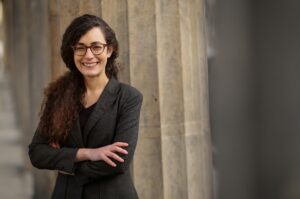Safo
Act I. A sparsely furnished but clean room at the Fingerhuts on the eve of Sofia Fingerhut’s wedding. Sofia, upon seeing her wedding gown, remarks, “A wedding dress! A dress you try on joyfully, put on tearfully, and take off fearfully.” Her apprehension mounts when she sees her groom, photographer Boris Stavropolsky, courting her younger sister Lise. Guests arrive, among them Cherna’s brother Shtempl, a wealthy fishmonger, and his daughter Manichka. Shtempl and Fingerhut argue, then settle down to a game of cards while Sofia’s girlfriends enter. The fathers fight over cards as well, so Boris takes out his guitar. Soon after he starts playing, Lise cries and runs out. Boris brings her back, and while the others try to calm Lise, Sofia declares, “You don’t know why she’s crying? I know. Lise is crying because she knows that tomorrow will not be my wedding day. She will not dance at my wedding.” Since Boris loves Lise, Sofia says will not stand in their way. When Boris tries to appease her, she further discloses that she is pregnant.
Act II. Five years later, in a room in Shtempl’s house, with a piano and expensive furniture, but decorated without taste. Manichka’s fiancé, Apollo Sonnenschein, has just returned to Odessa after years in St. Petersburg, and the Shtempls bring him up to date on the Fingerhuts: Sofia has a daughter (whom she calls her niece), and Lise is married to Boris, who has given up photography. Though Apollo at first refuses to play for the guests, he does play when Sofia arrives, and then escorts her home. The scene changes to an Odessa street at night. Boris with Tseyner, to whom he has just lost a lot of money. Boris expresses his undiminished ardor for Sofia. They exit; Sofia and Apollo enter. Apollo tells her that he no longer loves Manichka; the best he can hope for is to elevate her to his level. Back at the Fingerhuts’, Sofia refuses to answer her parents’ queries. She tells Boris to take Lise away and nurse her back to health. Left alone, Sofia consults a book of ancient history to clarify a remark Apollo made comparing her to Sappho. Legend holds that Sappho, in drowning herself, declared, “I give myself as an offering to the almighty Apollo, the god of beauty and poetry.” Apollo Sonnenschein arrives, and as Sofia wrestles with her emotions, a child’s voice summons her.
Act III. A hut. Apollo has married Manichka, and taken Sofia as his mistress. Fingerhut introduces Tseyner to Sofia, hoping to get rich by having them marry. When Apollo arrives, Sofia’s seven year-old daughter, Zhenichka, who dislikes him, leaves. He tells Sofia of two Apollos: one who loves her recklessly, and the other who worries about his reputation. Boris arrives with the sad news that Lise has died. Manichka goes, and Apollo emerges to see Boris, Sofia, and the child comforting each other—a scene that brings out his hatred toward his rivals for Sofia’s affection. Fingerhut arrives, and when the Shtempls arrive to retrieve Apollo, the in-laws exchange insults. Apollo, appalled by the attention from curious neighbors, forsakes Sofia and goes home with his wife, as a brawl erupts among the remaining family members.
Act IV. Sofia’s room, as in Act II. Sofia and Zheni pack to resettle in Sevastopol. Boris apologizes for the past, then tells Sofia he still wants to be with her to heal her wounds and help raise Zheni, but she rejects the proposal. Shtempl and Manichka enter, imploring Sofia for a way to make Apollo come back to them. She has no such power, she says, and they leave. Apollo enters, pleading to go with her, or for her to stay. But this is too little too late; she insists that he must go back to his wife and child. Zheni and Boris return, and the child reveals that she has long known the identity of her mother and father. This changes the plans; Sofia will bring Boris along to make the family officially “legitimate,” and devote the rest of her life to her daughter.
Article Author(s)

